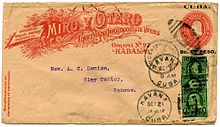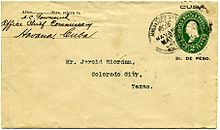- Corner card (philately)
-
The term corner card means the wording, sometimes with a pictorial feature, in the upper left hand corner of a postal stationery envelope.[1] It is there for the purpose of stating the sender's return address to facilitate the return of undeliverable mail.[2]
There are four general classifications of corner cards:[2]
- Partial request corner cards are a mere outline, letting the sender fill in the number of days for an undelivered envelope to remain before return plus the sender's entire name and address, e.g. "After __ days, return to ...";[3]
- General request corner cards have the printed name of the state or possession, e.g. "Philippine Islands";[3]
- Post Office request corner cards have the printed specific name of the post office, e.g. "Cristobal, Canal Zone";[3]
- Special request corner cards have the full name and address of the sender. These were used by commercial concerns with a large volume of correspondence. They would normally be ordered in multiples of 500.[2]
References
- ^ Van Gelder, Peter J.; The Collectors' Guide to Postal Stationery, A Squirrel Publication, Shrewsbury, UK (1997) ISBN 0947604073
- ^ a b c Krieger, George T.; The Postal Stationery of the Possessions and Administrative Areas of the United States of America; United Postal Stationery Society, 2009, ISBN 978-0-9800112-3-4.
- ^ a b c Slawson, George C., Editor; The Postal Stationery of the Possessions of the United States; United Postal Stationery Society, 1957.
Categories:- Postal stationery
- Philatelic terminology
Wikimedia Foundation. 2010.


